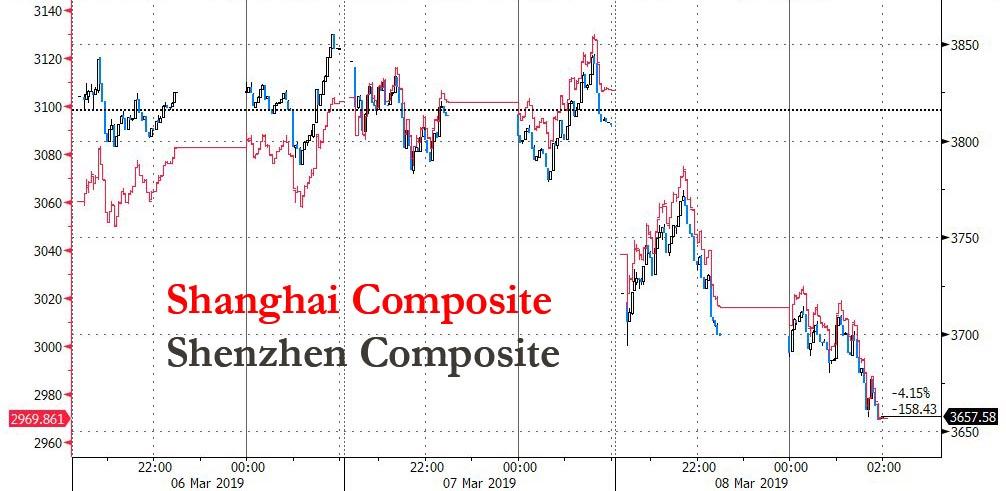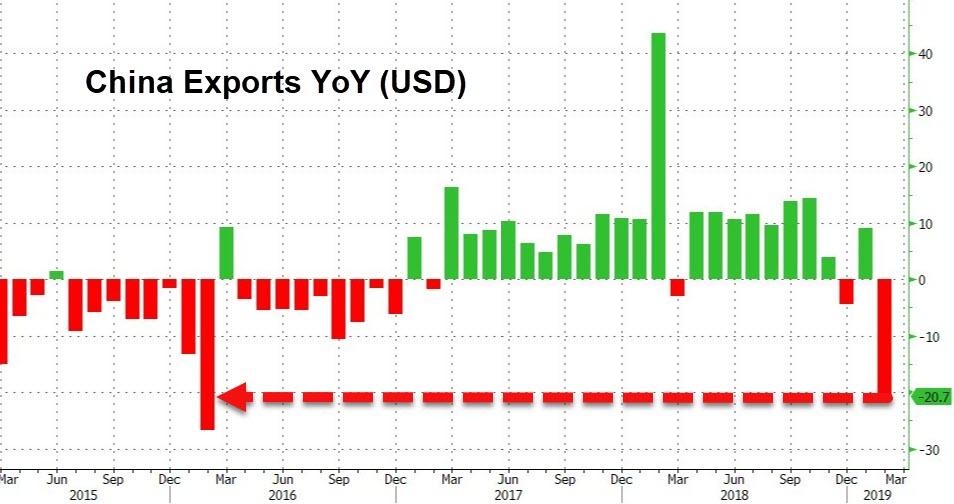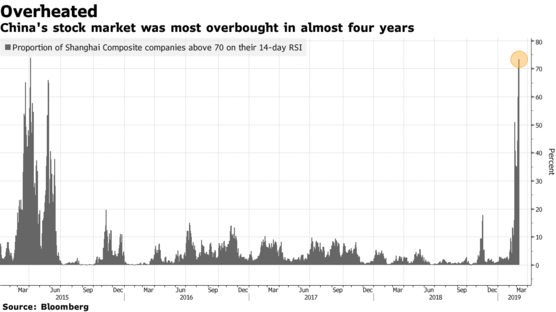Chinese Stocks Crash As Rare Sell Rating Shocks Traders
The question whether Beijing will tolerate another stock market bubble - one which it appeared to carefully cultivate until Friday - got an answer on Friday when Chinese stocks crashed, tumbling the most in five months. And it all started with a single sell rating.
The Shanghai Composite Index tumbled 4.4% to close below the key 3,000 point level, ending an 8-week rally, with the Shenzhen Composite and Chinext all following.

The drop was catalyzed by a limit-down plunge in state-owned insurer People’s Insurance Company of China, which had become a poster child of the ramp-up in equities, and which saw its shares sink by the 10 percent daily limit, after state-owned brokerage Citic Securities advised clients to sell the shares, saying they are “significantly overvalued” and could decline more than 50% over the next year.
Until Friday's plunge, PICC had surged by the maximum allowed by the exchange for five straight days, however, the downgrade sparked speculation that the order to put a lid on market euphoria had come from the very top:
"Such a sell rating must have been authorized by the regulators," said Yang Wei, a fund manager at Longwin Investment Management Co. "The stock market is overheating, there is too much speculation. Regulators want to see a slow bull market, not a mad bull market."
Until Friday's plunge, Chinese stocks had been unstoppable, gaining the past eight weeks to beat every other national market in the world, sparking memories of China's 2015 stock bubble which ended in a massive crash and killed investor sentiment for the next three years. Investor confidence was revived in 2019 thanks to the government’s focus on economic growth, the new securities regulator’s less stringent take on financial risk and optimism over China’s relationship with the U.S. However, the $1.8 trillion rally since January has been so fast it triggered signs of overheating in all of the country’s major benchmarks.
And nowhere were signs more evident than in shares of PICC Group, which listed in Shanghai in November, and whose shares had almost quadrupled through Thursday to close at 12.83 yuan.

This is where the government decided to finally step in: the "rational" price is between 4.71 and 5.38 yuan, Citic Securities analysts including Tong Chengdun wrote in a note. PICC Group’s Hong Kong-listed shares, which trade at a discount of about 74 percent, fell as much as 3.6 percent Friday. Goldman and JPMorgan also have negative ratings on the yuan-denominated stock. The $65 billion firm, which was the first insurer to list on the mainland in seven years, had become the 11th most valuable company on the Shanghai Composite.
As Bloomberg notes, this was the first time this year that China appeared to take steps to cool a buying frenzy that added almost $2 trillion to equity values and lifted market turnover to a more than three-year high. The government has until now been a big supporter of the rally, seeing it as a potential salve for overstretched corporate balance sheets and shaky consumer sentiment. But memories of the country’s disastrous 2015 boom and bust are still fresh.
The downgrade shocked investors who had been taking signs from the government as encouraging a new asset bubble.
China’s new securities watchdog had removed many of the curbs designed to keep out speculators, signaling an end to the highly restrictive era that started when a boom in the country’s stocks turned to bust in 2015. The resulting appetite for risk has sent the ChiNext, Shanghai Composite, Shenzhen Composite Index and CSI 300 Index all into bull markets and triggered a surge in turnover not seen in years, as Bloomberg notes. This is why Friday's downgrade caught virtually everyone wrong-footed:
"This sell rating is like a depth charge for the market," said Lin Qi, a fund manager at Lingze Capital. "The unwritten rule is that a securities firm will not be short on the market, much less single out a specific company. Given the size and importance of Citic Securities, such a move is significant."
Adding economic insult to bubble injury, stock losses extended Friday after trade data showed China’s economy was weaker than expected in February as exports tumbled the most in 3 years. Economists forecast both exports and imports would shrink, although not by as much.

It was not the first time Beijing targeted a specific stock to mute investor euphoria: in November 2017, China’s official media singled out a rally in liquor-maker Kweichow Moutai, saying the shares should rise at a slower pace. The result was the company's biggest one-day decline in over two years.
This time, it’s financial stocks which have been at the forefront of China’s soaring equity market, and just as they soared on the way up, they tumbled on Friday, and securities firms were among the biggest losers on Friday - a Bloomberg index tracking the stocks slumped 9.2%, paring its annual advance to 52%. Ironically, the company that downgraded PICC, Citic Securities, saw its own shares plunge by the 10% daily limit, the most on China’s large-cap gauge. Turnover on China’s exchanges totaled 1.18 trillion yuan ($176 billion), the most since November 2015.

Summarizing perfectly the bizarre state of the Chinese "stock market", where everyone is either buying, or selling at the same time, or simply oblivious, was Dong Baozhen, a fund manager at Beijing Lingtongshengtai Asset Management, who said that "the market in China can never find stability on its own, it’s either reaching for the sky or in the doldrums," adding that "the government needs to be very adept and subtle in its words to moderate the market. If they stay aloof, risks will pile up."
“It’s about time that stocks took a pause, as regulators are increasingly concerned by a market that’s growing fanatic,” said Zhu Junchun, a Shanghai-based analyst at Lianxun Securities Co. “While authorities want an active market, they don’t want one that’s overactive."
It remains to be seen if with this one intervention, the Chinese speculative mania has now been crushed and stocks will now selloff for the foreseeable future, or if China's speculative hordes are just taking a break for a few hours before plowing fresh trillions into the "market" that has become the world's greatest casino and where even the government is now saying to stay out.



